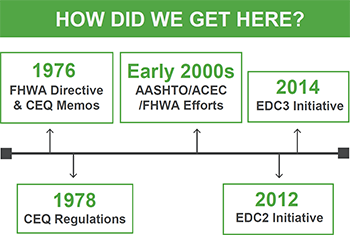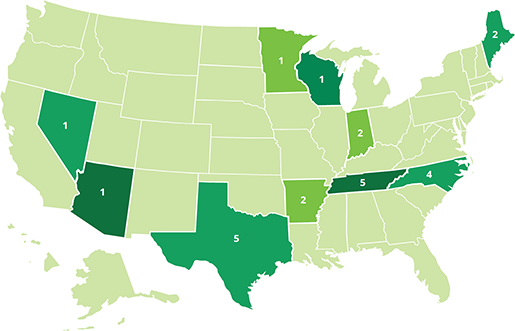
Environmental documentation written to comply with the National Environmental Policy Act (NEPA) plays an important role in communicating the environmental impacts of agencies’ decisions to the public and decisionmakers. However, producing documentation like Environmental Impact Statements (EISs), Environmental Assessments (EAs), and Categorical Exclusions can be time-intensive and can be a source of project delay when documentation does not clearly communicate the story of a project to stakeholders and the public.
The Federal Highway Administration (FHWA) Office of Project Development and Environmental Review (HEPE), the FHWA Resource Center (RC), the American Association of State Highway and Transportation Officials (AASHTO), and the American Council of Engineering Companies (ACEC), aim to help transportation practitioners in implementing quality environmental documentation (IQED). With this goal in mind, HEPE, the RC, AASHTO, and ACEC launched a number of efforts to help State and local transportation agencies produce quality environmental documentation, which can save time during the project review process.
This issue of Successes in Stewardship points practitioners toward best practices in IQED, which can help to balance regulatory compliance with clear writing and effective presentation of information. This issue also provides information about background on IQED efforts, ongoing IQED initiatives, and links to examples and resources.
Why Focus on IQED?
Quality environmental documentation is concise, written to be easily read and understood, and meets the requirements of laws and regulations—in other words it is legally sufficient. One benefit of developing clear, understandable documentation is that it demonstrates accountability and builds trust through engaging the public, decisionmakers, and regulatory agencies in a meaningful dialogue about projects. It also records agency decisionmaking and can reduce the need for potential legal recourse.
In 2003, FHWA, AASHTO, and ACEC formed an initiative to improve the readability and functionality of the documentation prepared for transportation projects in compliance with NEPA. The initiative outlined three guiding principles for producing quality environmental documentation in the 2006 report Improving the Quality of Environmental Documents. These principles focus on telling the story of the project, maintaining brevity and using clear language, and producing documents that are legally sufficient.
Guidance on the importance of outlining agency decisionmaking in a way that is easily understandable to stakeholders and the public has existed for many decades. However, the 2006 report built on existing guidance, outlining both the need for clear and legally sufficient documentation and best practices for creating this documentation.
How Does FHWA Support IQED?
In 2009, FHWA launched the Every Day Counts (EDC) initiative in partnership with AASHTO to speed up delivery of highway projects and address the challenges presented by limited budgets. Through EDC, FHWA works with State and local transportation agencies and industry stakeholders to identify a new collection of innovations to champion every two years. Throughout the two-year deployment cycle, specifications, best practices, lessons learned, and relevant data are shared among stakeholders through case studies, webinars, and demonstration projects. The result is rapid technology transfer and accelerated deployment of innovation across the nation.
EDC-2 (2013-2014)
EDC-2, the second year-long round of EDC, introduced IQED through promoting best practices for simplifying and expediting the development of environmental documentation. It focused on ensuring that the efforts for project purpose and need, consideration of alternatives, and impacts were appropriately documented and effectively included in NEPA documentation. The effort was designed to make NEPA documentation more effective in disclosing the information used in making project decisions to the public and participating agencies. In 2014, FHWA published Guidance on Making a Quality EIS Summary that provides a question-and-answer format to use when writing a quality EIS summary.
EDC-3 (2015-2016)
EDC-3 expanded on IQED efforts introduced by EDC-2 by improving collaborative processes. EDC-3 supported tools to foster collaborative, timely, and transparent interagency reviews, which can cut the amount of work and resources required, save time and money, and improve the quality of NEPA documentation for projects. Efforts included creating systems to facilitate document-sharing and collaboration between two or more agencies.

Efforts to implement quality environmental documentation extend back to the 1970s, beginning in 1976 with a directive from the FHWA and memos from the Council on Environmental Quality (CEQ). (Courtesy of FHWA)
What IQED Trainings, Technical Assistance, and Resources Are Available?
IQED Workshops
FHWA offers training and technical assistance to States interested in applying IQED strategies. Topics for these one or two day workshops range from a broad overview of IQED to more specialized topics tailored to meet an office’s needs. For example, recent workshops have focused on how to develop purpose and need statements and how to develop and evaluate alternatives. To schedule a workshop, contact Rob Ayers, Environmental Program Specialist, at Rob.Ayers@dot.gov.
Trainings and Technical Assistance
IQED techniques are included in the National Highway Institute (NHI) course NEPA and the Transportation Decisionmaking Process, which presents the historical background and evolution of NEPA and related environmental laws. FHWA is currently working to integrate IQED techniques into other trainings. To attend a course, visit the NHI website for details on available session dates and locations.
Number of IQED Workshops

Several States have participated in IQED workshops offered by FHWA. (Courtesy of FHWA)
Additional Resources
To learn more about practices for improving the quality of environmental documents, see the following resources.
What Is Next for IQED at FHWA?
Improving the quality of environmental documentation continues to be an area of focus for HEPE and the RC. Through these new and existing efforts, HEPE and the RC will continue to provide support and expertise on IQED to State and local transportation practitioners in the field. For updates on IQED and related project development and environmental review strategies, resources, and guidance, visit the Environmental Review Toolkit.
Successes in Stewardship is a Federal Highway Administration newsletter highlighting current environmental streamlining and stewardship practices from around the country. Click here to subscribe, or call (617) 494-2347 for more information.

